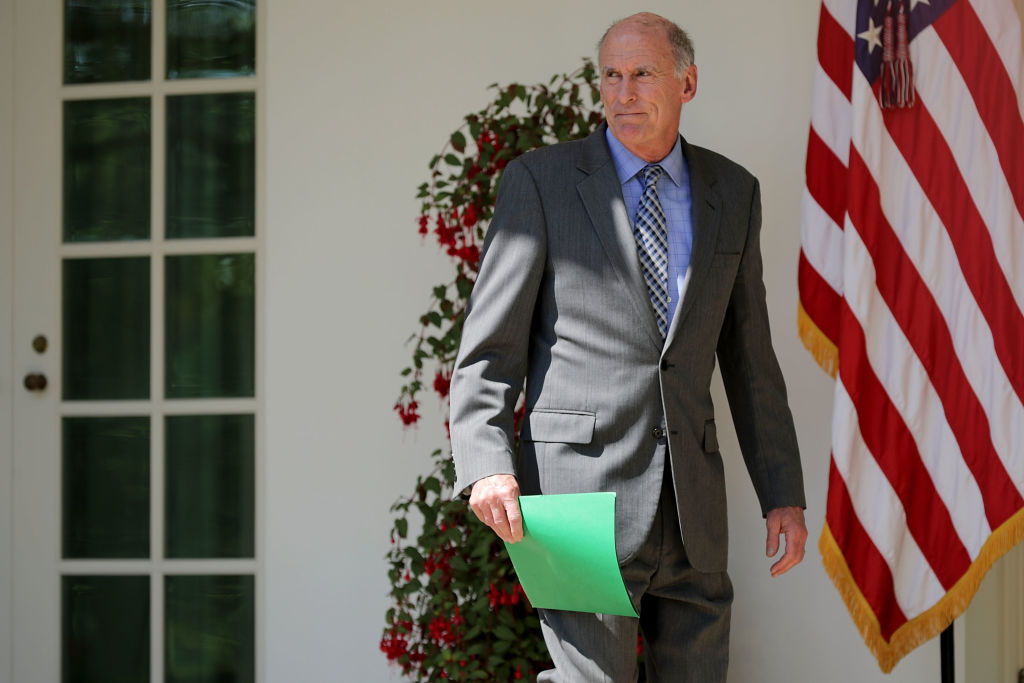Trump reportedly wants his intelligence briefers to discuss business, winners, Angela Merkel


A free daily email with the biggest news stories of the day – and the best features from TheWeek.com
You are now subscribed
Your newsletter sign-up was successful
President Trump's daily intelligence briefings focus less on the terrorist threats and covert missions his predecessors were interested in and more on the subjects intelligence agencies have learned "their No. 1 customer wants to hear about — economics and trade," The New York Times reports. "Intelligence officers, steeped in how Mr. Trump views the world, now work to answer his repeated question: Who is winning? What the president wants to know, according to former officials, is what country is making more money or gaining a financial advantage."
The President's Daily Brief is presented to Trump about twice a week now by Director of National Intelligence Dan Coats and CIA Director Gina Haspel, featuring "far more charts and visual aids to appeal to Mr. Trump," the Times says. National Security Adviser John Bolton reads and "conveys the highlights" of the written report to Trump on days when Coats and Haspel aren't invited.
Among the things that bore Trump in the traditional briefings are the "detailed analyses of the activities and motivations of secondary foreign officials" — he "wants information about the leader of various countries, not the underlings," the Times reports. "He has also shown a fascination with Angela Merkel, the German chancellor, repeatedly asking why she will not cut a deal with him on military spending despite his advisers' explanation" that Merkel is constrained by her governing coalition, and why Germany is buying Russian natural gas.
The Week
Escape your echo chamber. Get the facts behind the news, plus analysis from multiple perspectives.

Sign up for The Week's Free Newsletters
From our morning news briefing to a weekly Good News Newsletter, get the best of The Week delivered directly to your inbox.
From our morning news briefing to a weekly Good News Newsletter, get the best of The Week delivered directly to your inbox.
Trump also repeatedly asks "intelligence and military briefers about the cost of American bases overseas and the defense expenditures of allies in Europe and Asia," and he has "privately complained after national security briefings that, 'My generals don't understand business,'" a former administration official tells the Times. You can read more about Trump's intelligence briefing, and his overall critique that the intelligence community doesn't account enough for economics and trade as fundamental drivers of international conflict, at The New York Times.
A free daily email with the biggest news stories of the day – and the best features from TheWeek.com
Peter has worked as a news and culture writer and editor at The Week since the site's launch in 2008. He covers politics, world affairs, religion and cultural currents. His journalism career began as a copy editor at a financial newswire and has included editorial positions at The New York Times Magazine, Facts on File, and Oregon State University.
-
 How the FCC’s ‘equal time’ rule works
How the FCC’s ‘equal time’ rule worksIn the Spotlight The law is at the heart of the Colbert-CBS conflict
-
 What is the endgame in the DHS shutdown?
What is the endgame in the DHS shutdown?Today’s Big Question Democrats want to rein in ICE’s immigration crackdown
-
 ‘Poor time management isn’t just an inconvenience’
‘Poor time management isn’t just an inconvenience’Instant Opinion Opinion, comment and editorials of the day
-
 TikTok secures deal to remain in US
TikTok secures deal to remain in USSpeed Read ByteDance will form a US version of the popular video-sharing platform
-
 Unemployment rate ticks up amid fall job losses
Unemployment rate ticks up amid fall job lossesSpeed Read Data released by the Commerce Department indicates ‘one of the weakest American labor markets in years’
-
 US mints final penny after 232-year run
US mints final penny after 232-year runSpeed Read Production of the one-cent coin has ended
-
 Warner Bros. explores sale amid Paramount bids
Warner Bros. explores sale amid Paramount bidsSpeed Read The media giant, home to HBO and DC Studios, has received interest from multiple buying parties
-
 Gold tops $4K per ounce, signaling financial unease
Gold tops $4K per ounce, signaling financial uneaseSpeed Read Investors are worried about President Donald Trump’s trade war
-
 Electronic Arts to go private in record $55B deal
Electronic Arts to go private in record $55B dealspeed read The video game giant is behind ‘The Sims’ and ‘Madden NFL’
-
 New York court tosses Trump's $500M fraud fine
New York court tosses Trump's $500M fraud fineSpeed Read A divided appeals court threw out a hefty penalty against President Trump for fraudulently inflating his wealth
-
 Trump said to seek government stake in Intel
Trump said to seek government stake in IntelSpeed Read The president and Intel CEO Lip-Bu Tan reportedly discussed the proposal at a recent meeting
